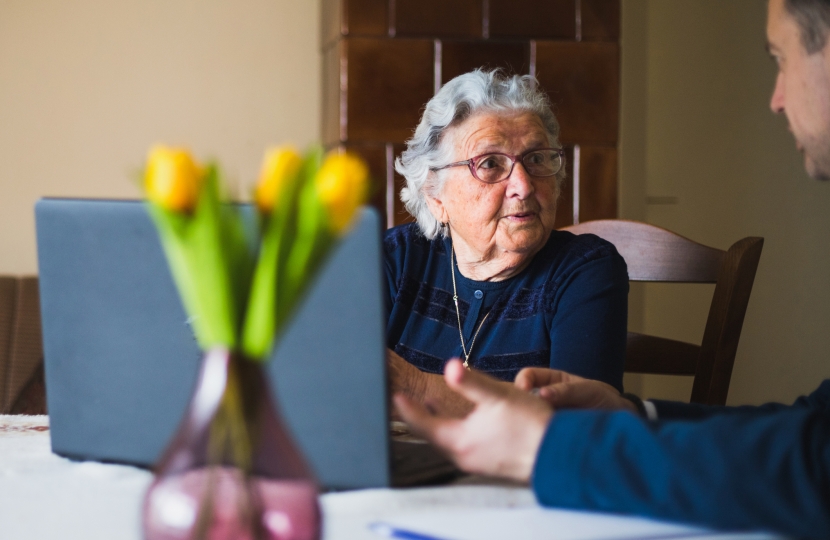
Scammers have been preying on unsuspecting victims for a long time, more so since the Coronavirus outbreak. It is now more important than ever that we are all do our best to protect ourselves and those we care about.
- Citizens Advice has recently found over a third of British adults (36%) have been the target of a scam since lockdown began.
- It is often the most vulnerable that are targeted. 50% of those at an "increased risk of coronavirus" have been contacted by scammers.
- The majority of people (64%) say they are worried someone they know will fall foul of a con.
Scams can take many different forms, the scammers can:
- Knock on your door (Doorstep crime).
- Telephone you (Telephone fraud).
- Email you.
- Hack your computer/online accounts (Online fraud).
Below you will find information that is aimed at helping you spot scams and how to avoid them.
Doorstep Crime
What is doorstep crime?
Doorstep crime includes traders cold calling at your door and claiming that work needs doing to your home or garden. They may prey on insecurities by saying there is a safety risk if you leave the work undone. If you agree to let them go ahead, the work is usually badly done and the price is put up because they pretend to have found extra things that needed doing.
Common types of cold callers can include:
- Your roof or guttering is damaged – when in reality it may not be.
- Trees on your property are unsafe and need attention – they may or may not be unsafe, but consult a qualified tree surgeon to find out.
- Your roof has moss on it which needs cleaning – the National Federation of Roofing Contractors advises that moss on a roof is not a problem and that this service is completely unnecessary.
- Your driveway needs cleaning – if you agree then the trader may persuade you to have other areas cleaned too, pushing up the price from the original estimate.
What to do if you suspect a fraudster
- Don't let them in the house.
- Get advice from an appropriate source of information. For example, a family member a friend, the local authority or Trading Standards.
- Keep an eye out for vulnerable neighbours who may be approached by cold callers. If someone has agreed to work from a cold call and there is no paperwork, it is likely that there will be a problem.
- If you suspect a fraudster undertaking work or preying on neighbours call the Police on 101 or you local Trading Standards Office.
If you need more help or advice please contact the Citizen's Advice Consumer Service on 03454 040506.
You can also report a potential fraud? Call 0300 123 2040 or visit the Action Fraud website.
Telephone Fraud
What is telephone fraud?
Fraudsters often try to trick older or vulnerable people out of their money by telephoning them at home and pretending to be someone trustworthy.
They use well-rehearsed stories which are designed to gain the victim’s trust, such as:
- pretending to be officials alerting you that your money or online accounts are in danger.
- pretending to be from your phone or computer service provider and claiming that there is a problem with your system that they need to fix.
Fraudsters often claim to be officials and can seem very genuine. But you should always remember that callers may not be who they claim to be, even if they already seem to know details such as your name and address.
What should I look out for?
- Genuine police or bank staff would never ask you to withdraw or transfer cash from your account, nor would they ever ask for your four digit bank PIN. Never tell anyone this number.
- Genuine computer firms will not call unexpectedly to help fix your computer. Fraudsters make these calls to try to gain access to your online bank account, or to trick you into paying for something you didn’t need, or to damage your computer with harmful software.
- Beware of anyone asking for money in advance. For example, fraudsters may claim that you are entitled to PPI compensation or that you are to inherit money from a relative, but you need to pay legal or administrative fees first. Genuine firms don’t ask for this, it is likely to be a scam.
- If you’ve already been a fraud victim, beware that fraudsters may pretend to be lawyers or police claiming they can help recover your money.
- The most common type of fraud affecting older residents in North Wales is safe account fraud. This is where fraudsters persuade victims to transfer money into accounts that the fraudsters provide, claiming that will protect the victim’s money from fraud. Never transfer money to an account given to you over the phone. If you are in any doubt, end the call and speak with your bank – in person if possible.
What to do if I get a call like this
- Be sceptical of callers, even those who claim to be officials.
- Don’t be afraid to put the phone down with a brief ‘no, thank you’.
- NEVER give personal information, such as your date of birth or bank details, to unexpected callers.
- NEVER allow an unexpected caller to talk you through processes on your computer, such as downloading new software or accessing your online bank account.
- Remember that the police or your bank would NEVER unexpectedly call you and ask you to withdraw cash or move your money to another account, for any reason.
- If callers suggest you call your local police or bank to check who they are, use another phone or ensure the line has been fully disconnected by phoning a friend or relative first, or by waiting at least 3 minutes. Otherwise you may think you’ve phoned that number, but you’re simply talking to the fraudsters again. This is a common scammer tactic.
- If a caller asks you to type your bank PIN into your telephone handset - do not do this, they can use technology to identify the numbers.
- You can opt out of many cold calls by registering for free with the Telephone Preference Service on 0845 070 0707
Your local Trading Standards team can install a free call block service to the phone line of a person experiencing the onset of dementia.
Cold Calling
What is cold calling?
Cold calling is a form of telephone fraud.
Cold calls are phone calls from companies trying to sell you something, even though they have had no business with you previously. Cold calls aren’t usually illegal and don’t necessarily count as a scam although they can be annoying, frustrating and even frightening. Unfortunately, there are times where cold callers can be trying to scam you and it is appoint to be wary when receiving these calls.
As with other forms of scams, it is important to NEVER reveal your personal details and to hang up if you feel harassed or intimidated. If you are unsure of the legitimacy of the caller, then end the call and ring the organisation they were claiming to be back, however, it is important to find the number yourself and not use the one you have been called on. You can then check if it matches the one you have been called on.
One of the most common cold calls that people receive is one relating to Personal Injury Compensation claims. Ninety-three per cent of UK adults think there should be a total ban on calls and texts about personal injury compensation claims. The figure rises to 97 per cent among the 29 million UK adults who received such a call or text in the last year.
What can I do to prevent cold calls?
Even though it won't necessarily block scammers, you can register for free with the Telephone Preference Service (TPS) to reduce the number of cold calls you receive.
You can also talk to your phone provider to see what other options they offer regarding call-blocking. Many privacy services are offered by phone providers so this is quite common. Some services may need to be paid extra for however.
Which? also offers advise on how to prevent Cold Calls. Their advice can be accessed here.
How to report a cold call
You can complain to the Information Commissioner’s Office or report spam texts by forwarding the text for free to 7726.
Ofcom offers advice on what to do when you receive unwanted calls or cold calls. https://www.ofcom.org.uk/phones-telecoms-and-internet/advice-for-consumers/problems/tackling-nuisance-calls-and-messages.
Email Fraud
What is email fraud?
Fraudsters can obtain your email and send you an email pretending to be someone trustworthy.
They use well-written emails which are designed to gain the victim’s trust, such as:
- pretending to be your bank, utility or service provider alerting you to a problem with your account.
- pretending to be from your phone or computer service provider and claiming that there is a problem with your system that they need to fix.
Fraudsters emails can seem very genuine. But you should always remember that they may not be who they claim to be, even if they already seem to know details such as your email, name, and address.
Five ways to spot a scam email
- Genuine companies don't ask for your sensitive details via email - if you receive an email providing a link and asking for sensitive information - it's a scam!
- Beware of RE: URGENT subjects - these aim to get you to react without thinking.
- Companies have domain emails - Don't just check the person sending the email, check the email by hovering your mouse over the 'from' address. No legitimate organisation will contact you from an address ending in @gmail.com or @hotmail for example.
- Forcing you to a website or click attachment - sometimes a scam email is made so clicking on any part of the message will open a fake webpage or download spam onto your computer - check before you click!
- Make sure that any phone numbers in the email match those on the website of the company spending the email.
What to do if you suspect an email of being a scam
If you get any suspicious emails forward them to report@phising.gov.uk so the National Cyber Security Centre can test the website they link to and remove it if it is a scam.
If you have been a victim of an online scam or fraud, this needs to be reported to Action Fraud: actionfraud.police.uk or 0300 123 2040.
Online Fraud
What is online fraud?
Online fraud or cyber crime can take many forms, it can:
- take place online
- be committed using computers, or
- be assisted by online technology
Do's and Don'ts to avoid being scammed
Do
- Research the company you are buying from to check that they're legitimate.
- Check that the site that you're shopping on is secure - look for a padlock in the website's address bar - this means the information you are sending to the website, like your card details, is secure.
- Use the latest version of your internet browser and make sure your software and apps are up to date. This includes antivirus software - to protect you against the latest threats.
- Monitor your bank and credit card activity for any suspicious purchases.
- Use strong passwords.
Don't
- Click on the link in unsolicited emails.
- Ignore your browser if it tells you a website is insecure.
- Be tempted to buy goods with prices that are too low or too good to be true.
- Purchase goods from sites that do not have a return or refund policy.
